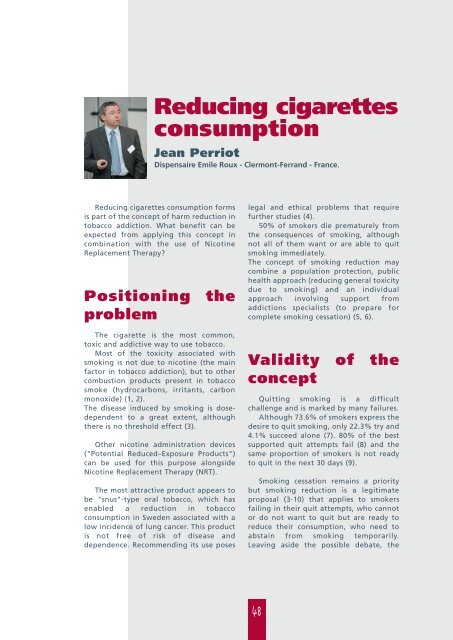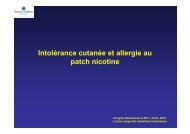Nicotine replacement therapy … - Carlos A ... - Entretiens du Carla
Nicotine replacement therapy … - Carlos A ... - Entretiens du Carla
Nicotine replacement therapy … - Carlos A ... - Entretiens du Carla
You also want an ePaper? Increase the reach of your titles
YUMPU automatically turns print PDFs into web optimized ePapers that Google loves.
Re<strong>du</strong>cing cigarettes<br />
consumption<br />
Jean Perriot<br />
Dispensaire Emile Roux - Clermont-Ferrand - France.<br />
Re<strong>du</strong>cing cigarettes consumption forms<br />
is part of the concept of harm re<strong>du</strong>ction in<br />
tobacco addiction. What benefit can be<br />
expected from applying this concept in<br />
combination with the use of <strong>Nicotine</strong><br />
Replacement Therapy?<br />
Positioning the<br />
problem<br />
The cigarette is the most common,<br />
toxic and addictive way to use tobacco.<br />
Most of the toxicity associated with<br />
smoking is not <strong>du</strong>e to nicotine (the main<br />
factor in tobacco addiction), but to other<br />
combustion pro<strong>du</strong>cts present in tobacco<br />
smoke (hydrocarbons, irritants, carbon<br />
monoxide) (1, 2).<br />
The disease in<strong>du</strong>ced by smoking is dosedependent<br />
to a great extent, although<br />
there is no threshold effect (3).<br />
Other nicotine administration devices<br />
("Potential Re<strong>du</strong>ced–Exposure Pro<strong>du</strong>cts")<br />
can be used for this purpose alongside<br />
<strong>Nicotine</strong> Replacement Therapy (NRT).<br />
The most attractive pro<strong>du</strong>ct appears to<br />
be "snus"-type oral tobacco, which has<br />
enabled a re<strong>du</strong>ction in tobacco<br />
consumption in Sweden associated with a<br />
low incidence of lung cancer. This pro<strong>du</strong>ct<br />
is not free of risk of disease and<br />
dependence. Recommending its use poses<br />
legal and ethical problems that require<br />
further studies (4).<br />
50% of smokers die prematurely from<br />
the consequences of smoking, although<br />
not all of them want or are able to quit<br />
smoking immediately.<br />
The concept of smoking re<strong>du</strong>ction may<br />
combine a population protection, public<br />
health approach (re<strong>du</strong>cing general toxicity<br />
<strong>du</strong>e to smoking) and an indivi<strong>du</strong>al<br />
approach involving support from<br />
addictions specialists (to prepare for<br />
complete smoking cessation) (5, 6).<br />
Validity of the<br />
concept<br />
Quitting smoking is a difficult<br />
challenge and is marked by many failures.<br />
Although 73.6% of smokers express the<br />
desire to quit smoking, only 22.3% try and<br />
4.1% succeed alone (7). 80% of the best<br />
supported quit attempts fail (8) and the<br />
same proportion of smokers is not ready<br />
to quit in the next 30 days (9).<br />
Smoking cessation remains a priority<br />
but smoking re<strong>du</strong>ction is a legitimate<br />
proposal (3-10) that applies to smokers<br />
failing in their quit attempts, who cannot<br />
or do not want to quit but are ready to<br />
re<strong>du</strong>ce their consumption, who need to<br />
abstain from smoking temporarily.<br />
Leaving aside the possible debate, the<br />
48






